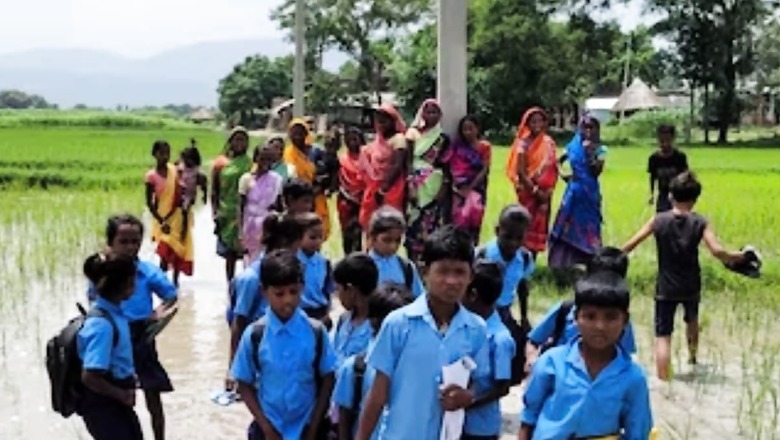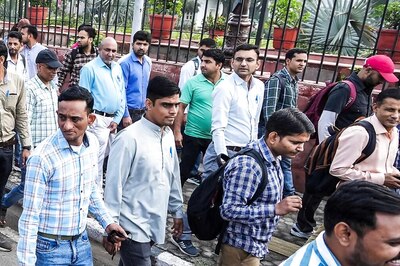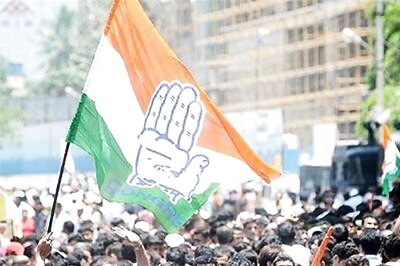
views
With the Gross State Domestic Product (GSDP) of Rs 24 lakh crore, Tamil Nadu has the biggest economy among the South Indian states, but caste discrimination and incidents of violence remain all pervasive, which show the grim reality of socio-economic conditions of some people living there.
Dravidian politics often seeks to portray caste discrimination as being perpetrated by only a few forward castes. On the other hand, there is ample evidence that caste chauvinism and violence often stem from most of the dominant communities in the state.
Here is a look at some of the recent caste discrimination incidents in the state.
• August 11, 2023: In Nanguneri, a 17-year-old Scheduled Caste (SC) boy and his 14-year-old sister were attacked with sickles after complaining about caste-based harassment.
• September 6, 2023: Students boycotted a school breakfast scheme in Karur because the food was cooked by a Dalit woman.
• July 25, 2023: A man from the Adi Dravidar community was forced to fall at the feet of a group of dominant caste members.
• July 1, 2023: Police had to help carry a Dalit woman’s body for burial after the upper-caste villagers denied passage in Shoolagiri.
• August, 2022: A Dalit woman was brutally assaulted by the Kallar community members when she tried to feed her cattle in a grass field in Thanjavur district.
It has been seen that Vanniyars, Thevars, Mudaliars and Gounders have all been implicated in caste-based violence in the state. For instance, Vanniyars have been involved in violent clashes over inter-caste marriages and have opposed Dalit participation in temple festivals. Similarly, Gounders have been implicated in various forms of discrimination against Dalits.
Domination of Violence
Violent clashes between OBCs and Dalits have been a feature of the southern districts of Tamil Nadu for many decades. National Crime Records Bureau data shows crimes against vulnerable groups have increased in the past few years. Under Atrocities/Crime against Scheduled Castes, Tamil Nadu recorded an increase from 1,144 cases in 2019 to 1,274 cases in 2020 and 1,377 in 2021 – a rise of 16.92% of cases in two years. This is higher than the all-India increase of 9.7% for the same period.
The data from the home ministry shows that 345 villages in Tamil Nadu are “atrocity prone” for crimes against SC and ST communities.
An RTI query also revealed that in the previous five years, 300 caste-related murders were registered in the state in which most of the victims were Dalit. Madurai topped the district with the highest number of atrocities against SC/STs in 2021, followed by Thanjavur, Tiruchy and Pudukkottai.
Social Engineering Tactics
Politics of caste reservation has been often manipulated to serve interests of dominant groups. The state’s long history of social justice movements has been counterbalanced by strategic inclusion of dominant castes in the OBC list.
Pattali Makkal Katchi party sparked off the movement for quota for Vanniyar lower caste in 1980s. Many other dominant castes followed suit. These castes, often landowners or business owners, wielded significant power and political influence. Dravidian parties, which have ruled the state in succession, have happily pandered to reservation demands in return for votes.
Dominant castes often highlight the instances of economic hardship or social discrimination within their communities as evidence for their ‘backwardness.’ This narrative, although misleading, gained traction. This has resulted in reservations in Tamil Nadu increasing from 41% in 1954 to 69% in 1990. Other Backward Castes and Muslims together account for 30% reservation, Most Backward Castes 20%, Scheduled Castes 18% and Scheduled Tribes 1%.
Successive governments have also watered down any attempt to skim the creamy layer from OBCs. For example, in 2021, an order was given not to insist on income proof from those applying for OBC certificates.
Dominant castes in the OBC list have cornered the employment scene, and worsened the skew against SC/STs. A white paper tabled in assembly in 2000 highlights how backward classes are over-represented and Most Backward Classes, SCs and STs are underrepresented in jobs in Tamil Nadu. This under-representation of SCs and STs in the government and private institutions has further weakened social justice in the state.
Hotbed of Casteism?
Educational institutions have often played a crucial role in perpetuating discrimination by molding young minds in casteist mentality.
The teen brother and sister attacked in Nanguneri in August were set upon by their own classmates. Last year, a school student near Ambasamudram was stoned to death by fellow students over a caste dispute. An SC student of Class 10 and his grandmother were assaulted in Karur.
• In February this year, a teacher at a government-aided school in Dindigul abused two Dalit students, leading to them consuming poison. That teacher belonged to the Chettiar caste.
• A few months ago, a Dalit boy in class six was humiliated by the school headmistress and teachers in front of students in Vellakoil.
• A headmistress in Tirupur was suspended after it was found that she made SC students clean toilets and water tanks.
However, not all of the caste-based incidents against lower castes have been perpetuated by Brahmins.
During the tenure of the UPA government, the national advisory council headed by Sonia Gandhi had formed a subcommittee to recommend measures to prevent caste discrimination in schools. Those recommendations were never implemented.
In 2017, the state government had formed school-level committees headed by physical education teachers to monitor caste issues. Most of these committees are not functioning now.
In conclusion, Tamil Nadu has a long road ahead in eliminating caste discrimination. It would involve policy changes, educational reforms, and a societal transformation.
But most importantly, it would require the acknowledgment from Dravidian parties that the caste violence is now out of control. There is an urgent need to rationalise reservation policy in Tamil Nadu on a scientific basis.



















Comments
0 comment